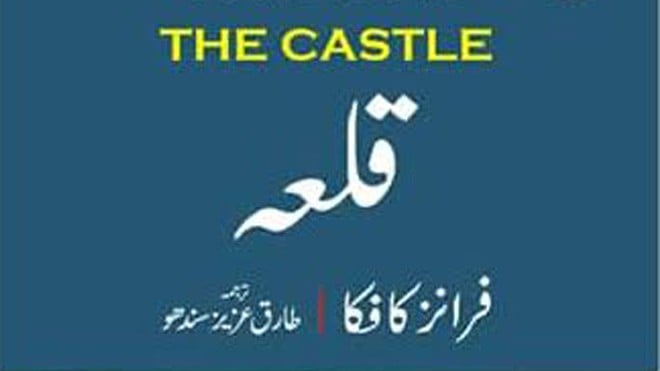
A worthy translation of Kafka’s The Castle by Tariq Aziz Sindhu

The popularity of Franz Kafka refuses to wane as neither time nor changing age has been able to reduce his magic. Each generation of writers deciphers new meanings and interpretations from his works, thus making him relevant for all times. Whenever one comes across surreal situations one’s thoughts naturally drift towards Kafka’s timeless characters. Even Zulfikar Ali Bhutto has described his trial as ‘Kafkaesque’, since he knew he was being dubiously set up.
Just like many other geniuses, Kafka lived a life that was anything but ordinary. He was not interested in publishing any of the works he jotted during his lifetime, and he said this to Max Brod, his friend and editor. But Brod didn’t burn the manuscripts as per Kafka’s will and that is how the world learnt about the phenomenon that is Franz Kafka.
Kafka’s greatness is evidenced by the fact that his works were translated in numerous languages, Urdu being one of them. Previously, noted fiction writer Naiyer Masud translated some of Kafka’s short fiction into Urdu. This was a delight to read due to the outstanding translation. Urdu novelist Muhammad Asim Butt, besotted with Kafka, translated his short fiction as well as his longer stories.
This translation of The Castle has been done by Tariq Aziz Sindhu, a police officer by profession and a literary buff by inclination. He has titled it Qila.
Sindhu was the ears and eyes of many literary activities during his stay at the Government College Lahore and after securing a Master’s degree in English literature he joined the Civil Service of Pakistan. He is full of knowledge about the latest books on history, philosophy, and literature.
Sindhu’s command over English as well as Urdu makes him well-suited to render The Castle into Urdu. He has tried his utmost to retain the original flavour and ambience of the novel which is a supreme example of surrealism in English literature. The central character, K, finds himself at the mercy of the all-powerful ubiquitous administration of the castle. Everything is strange rather macabre and people are aghast to see the land surveyor amongst themselves. Thus starts a novel that has become a classic over the decades due to its relatability to different ages.
Although Kafka died before he could finish The Castle, he had a certain plan about the fate of the land surveyor that he had discussed with Brod. Hence, we know what Kafka had in mind: "Kafka never wrote the concluding chapter. But he told me about it once when I asked him how the novel was to end. The ostensible land surveyor was to find a partial satisfaction at least. He was not to relax in his struggle but was to die worn out by it. Round his death bed the villagers were to assemble, and from the Castle itself the word was to come that though K’s claim to live in the village was not valid, yet, taking certain auxiliary circumstances into account, he was to be permitted to live and work there".
But that was not to be. The greatness of Kafka lies in the fact that though still unfinished, it is still a classic of higher order. Many great writers like Gabriel Garcia Marquez showered great praise on Kafka’s fiction.
Sindhu has been successful in retaining the original zest of the novel. However, there are a few typos that should be taken care of in the next edition.
Dr Enver Sajjad and Dr Tabassum Kashmiri have endorsed Sindhu’s translating skills, that he truly deserves credit for. We should take delight in the news that he is busy translating other works of fiction into Urdu. All said and done, the Urdu translation of The Castle by Kafka must be read by all those hooked to serious literature.